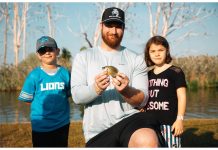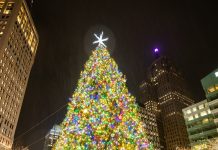 Officer Dani Woods graduated from the Detroit Police Academy to join the Detroit Police Department inÌý2001. She has gone on to become the departmentâs foremost advocate for LGBT issues. Sheâs a pillar of the community on many fronts, from walking the Motor City Pride in uniform and waving the LGBT flag at the June parade to training her fellow officers on proper responses to LGBT cases that spark neighborhood dialogues about equality. We caught up with Woods, who some might call the âprideâ of DPD.
Officer Dani Woods graduated from the Detroit Police Academy to join the Detroit Police Department inÌý2001. She has gone on to become the departmentâs foremost advocate for LGBT issues. Sheâs a pillar of the community on many fronts, from walking the Motor City Pride in uniform and waving the LGBT flag at the June parade to training her fellow officers on proper responses to LGBT cases that spark neighborhood dialogues about equality. We caught up with Woods, who some might call the âprideâ of DPD.
ÌÇŴÄvlogḞĠṪṡḞæ Detroit: How did you become the Detroit Police Departmentâs LGBT liaison?Ìý
Officer DaniÌýWoods:Ìý[Former] Chief [Ralph] Godbee asked me to represent this position. I came to him when it was still kind of in a taboo state to talk about LGBT openly. It wasnât to the magnitude of disrespect or disservice, it was still just kind of fresh. So it didnât really resonate with a lot of people that I was talking to. Then a few years later, he attended training in Atlanta, and he gave me a call and said, âHey they have this officer for the LGBT community, I was thinking maybe we could do something like that.ââ I joined on and there was a meeting of the minds amongst the law department, the police department, members of the LGBT community, activists â people who just genuinely want to bring everyone together. It started with drafting a directive to hold officers accountable for mistreatment of the LGBT community, because that was one of the complaints. [Oftentimes] people of the community donât come forward or donât report because they donât feel as if theyâre going to get the proper service from law enforcement, which stems from a long line of mistrust, it didnât just happen yesterday. We sat at that table for almost a year, and finally, the language was right. Everybody at the table approved, then it went through its different stages with our planning and accreditation unit and the Board of Police Commissioners. Then âḊ we had some changes in administration and my position was kind of placed I wouldnât say on the back burner, but it wasnât given the attention it deserved. Once James Craig became the chief of police for Detroit, that was one of his first things. He said, âI had a liaison in Cincinnati, why donât you guys have one?â He brought me in and allowed me to hit the ground running.
What does your role entail?
Iâm very hands on with anything LGBT-related. Whether itâs domestic violence or a homicide a good moment or if itâs a complaint. Iâm in the mix to make sure the proper steps are being taken. For instance, it may be viewed as small, but something like the proper pronouns being used when addressing members of the LGBT community. Even with officers that may be LGBT, Iâm there for their services as well.
What makes DPD different from departments across the country when it comes to LGBT issues?Ìý
I think weâre trailblazers. We just had our first black trans woman. Sheâs in the police academy right now, doing well and living her dream. Iâm the first LGBT liaison for the department. Just building these relationships and the consistency with community relations, that in and of itself says so much about how we as a department care about our citizens. As things change, as the world changes, you either change with it or you get left behind. As a police department, it only makes sense that we definitely make the necessary changes, keeping our citizens first, ensuring the safety of both our officers and the community. Thatâs our deal.
What was behind the decision for you to walk in the Motor City Pride Parade?Ìý Ìý
Chief Craig, again, with the locations heâs worked at before. He said: âHow better to tell the community that you have the support of the police department than to have an officer march in uniform in the parade?â I wear both hats. I am an out lesbian and I am a police officer.
What other goals do you have?
Weâre doing the LGBT action team. Thatâs getting the LGBT community involved in anything and everything. I understand that not everybody is pro-police and thatâs fine. But if I can help to change someoneâs mind about the police and their interactions, and change the conversation and create dialogue to where we can at least meet halfway, I feel like Iâm doing my job. I would like to start going into the schools and get to know our LGBT youth. Itâs always about this group or that group, but so often we forget about the LGBT youth. So for right now, getting everybody involved.
Weâre expanding our advisory board: weâre going to be doing quarterly conversations. Letâs talk about the uneasy moments and the uncomfortable things without all the politics and structure. Letâs get real about it and really develop and devise plans and solutions. We can talk about anything until youâre blue in the face, but if you have no solution, whatâs the point?
|
| Ìý |
|








